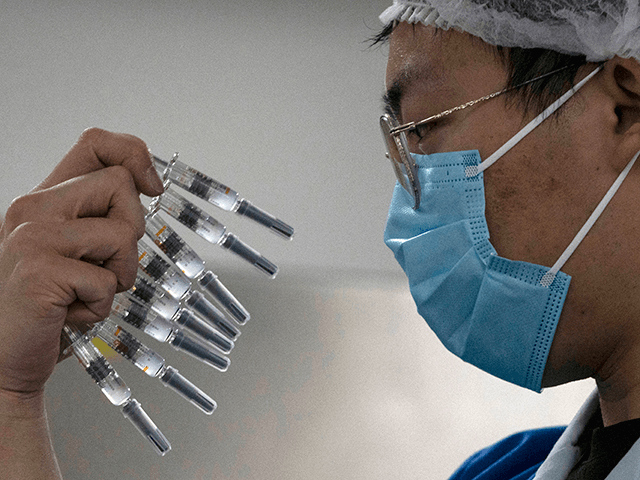The anti-communist newspaper Epoch Times claimed in an article Thursday to have obtained Chinese Communist Party documents detailing a wide array of negative outcomes in people who had received Chinese-made coronavirus vaccines, including diarrhea, rashes, shortness of breath, and coronavirus infection.
Beijing is currently struggling to convince its domestic population to participate in its nationwide vaccination drive, achieving significantly lower vaccination rates than many Western states. Adding to the lack of urgency on the public’s part to receive doses of the vaccines available to them – all of them made in China – is the fact that the head of China’s Center for Disease Control (CDC) admitted this month that Chinese-made vaccines “don’t have very high protection rates.” The official, Gao Fu, called coverage of his statement a “complete misunderstanding.”
China has approved five Chinese-developed vaccine candidates against the Chinese coronavirus at press time under emergency use provisions. The first vaccine to receive approval is from the firm Sinovac Biotech. Two of the vaccine candidates approved were produced by Sinopharm. CanSinoBIO and Anhui Zhifei Longcom developed the other two.
The two most prominent options are from the firms Sinovac and Sinopharm. Beijing has invested heavily in promoting the international sales of the vaccines, particularly Sinovac’s product “Coronavac,” while doing little to promote vaccination at home. Chinese dictator Xi Jinping has repeatedly used international venues to urge other countries to purchase the products but has not participated in any domestic vaccination initiatives. The Chinese communist regime has refused to state if Xi himself will receive vaccination doses or if he has already done so.
Chinese state media predicted that a vaccine developed by the American company Pfizer in conjunction with European firm BioNTech may be available to Chinese citizens by July, a sign of little demand for homemade products.
The Epoch Times claimed to have obtained three separate Chinese government documents, all from Hebei province. The first, dated April 8, detailed “adverse reactions” to Chinese-made coronavirus vaccines, including “rashes, fever, nausea, diarrhea, chest tightness, and shortness of breath.” Another detailed one case of an individual who repeatedly tested positive for coronavirus infection despite being fully vaccinated, raising suspicions that vaccinated people may be able to spread the virus to those who do not receive inoculations in the case of the Chinese-made products.
A third allegedly obtained document, branded “extra urgent and non-disclosure to the public,” demanded that local government officials in Hebei enhance observation of people who had received homemade Chinese vaccines and “investigate and properly handle any cases where vaccination caused death, severe disability, or other adverse reactions that could have a major effect on society.”
The Epoch Times attributed the documents to a “trusted source” and did not indicate that any of the documents highlighted any specific homemade Chinese vaccine as of particular concern.
The two vaccines currently available in the United States, unlike those available in China, use novel mRNA technology to induce an immunological response that creates antibodies preventing coronavirus injections. Both the Pfizer and Moderna vaccines test at about 95 percent efficacy in preventing infections. In contrast, the Sinovac product tested at about 50.38 percent efficacy at preventing infections during clinical trials, meaning nearly half of those vaccinated were still infected. One of the Sinopharm vaccines reportedly tested at 79.24 percent efficacy in preventing infections. Chinese firms have not provided detailed clinical trial data on the rest at press time.
China has largely focused on selling Sinovac’s product abroad. Xi Jinping referred to Chinese vaccines as a “global public good” in his address to the World Health Assembly last year, vowing China would focus on distributing the vaccines abroad. The low effectiveness rate of the vaccine has prompted international concern, however, given the high rates of coronavirus infections in places that have relied on the product. In Chile, for example, a nationwide vaccination push has resulted in over 40 percent of the population receiving vaccines, but upwards of 90 percent of these individuals received the Sinovac candidate. Coronavirus infection rates began skyrocketing roughly at the same time that the vaccine push accelerated, raising questions about how safe a community that relies on Chinese-made vaccines can consider itself.
Chilean media have documented fever, muscle aches, swelling of the arm, headaches, and nausea as side effects common to the Sinovac vaccine candidate. As the other Chinese vaccines have not enjoyed as widespread international distribution, little information is available at press time regarding their potential side effects to compare to the claims in the Epoch Times report.
Gao Fu, the Chinese CDC head, admitted that Chinese vaccines were underperforming in mid-April.
“It’s now under formal consideration whether we should use different vaccines from different technical lines for the immunization process,” Gao revealed.
Shortly after his remarks, Chinese state media outlets began touting the alleged existence of a Chinese-made mRNA technology vaccine against the Chinese coronavirus. That speculation yielded quietly to reports, however, that China was preparing to introduce the Pfizer vaccine into the Chinese market. Chinese state media were careful to refer to it by the name of its non-American developer, BioNTech, and note that a Chinese company, Fosun Pharmaceuticals, made a minor role in funding the vaccine. Fosun is a parent company of Sinopharm, Sinovac’s competitor.
“Fosun Pharm has submitted the clinical trial data of a COVID-19 [Chinese coronavirus] mRNA vaccine it co-developed with German BioNTech and relevant materials to China’s state regulator for rolling review,” the state-run Global Times newspaper claimed this week.
On Thursday, the Global Times predicted, citing “a source,” that the Pfizer vaccine would be available to Chinese citizens before July, making it the first foreign vaccine against Chinese coronavirus available in the country outside of Hong Kong, which approved (and later discontinued) a vaccine by European firm AstraZeneca.

COMMENTS
Please let us know if you're having issues with commenting.